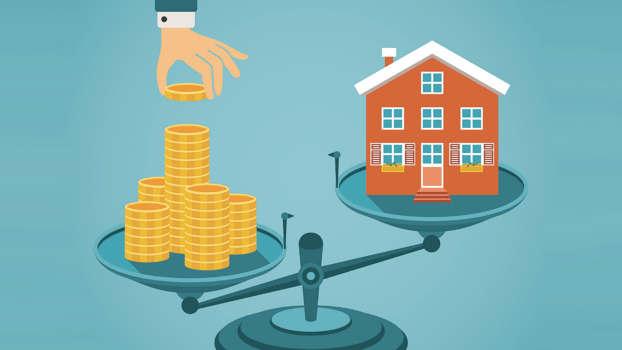Guide | How to Find & Get the Best Home Mortgage Rates or Home Equity Loan Rates
So you’re chasing the American dream and have decided to buy a house. You may not know much about home mortgage rates, so you’ve considered finding a broker who can help you out.
The good news for you—and your wallet—is that the middleman isn’t as necessary as you’d first suspect.
All information about home equity loan rates is available to the public and as easily accessible as information is regarding brokers.
If you shop broadly and gradually narrow your search to find a lending environment you’re most comfortable with, you’ll be able to find home loan mortgage rates you can afford. With our tips to finding the best home refinance rates, you’ll be able to work out a deal for yourself with home equity rates that save you the most money and best-suit your situation.
Establish Your Baseline
Home equity loan rates depend largely on what you’re willing to pay or not pay. Take a look at your lifestyle and budget to figure out what type of home mortgage loan rates you would be able to afford.
Understanding where you are at financially will help you in your search for the best home loan rates.



Image Source: Best Home Equity Loan Rates
Additionally, cash reserves are very relevant in the mortgage world and are measured by the number of months’ worth of house payments you have in cash.
The standard requirement is two months, meaning you must have enough cash reserves after closing to cover your new home equity loan rates (i.e., principal, interest, taxes, and insurance) for at least the next sixty days.
Raise Your Credit Score
Without a doubt, your credit score will affect your home refinance rates. Take a moment to check out your credit score for free at a website like creditkarma.com or creditcards.com to become more aware of your credit profile.
Believe it or not, this is one of the most important things you can do before you research home equity loan rates as you can find resources that will inform you of different reasons for why your credit score could improve or decline.
If your credit score isn’t where you’d like it to be for the lowest home equity rates, you should invest in a secured credit card.
As you begin making on-time minimum payments to your creditors and keep your balances low relative to the credit limit, your positive payment activity will be reported to major credit bureaus. Soon, you will begin to see improvement in your credit score which will positively affect your home mortgage loan rates possibilities.
Research Loan Types
There are separate types of loans that will influence your home equity loan rates.
Most commonly, there are three types of loans:
- Fixed. The home equity rate remains the same throughout the life of the loan, usually in terms of 30, 15 or 10 years. While the 30 year is most popular, the 15 builds equity at a much faster rate.
- Adjustable-rate mortgages (ARMs).Home loan mortgage rates that change based on a specific schedule after a fixed duration at the start of the loan. More info about these types of home rates can be found here.
- Interest only.The home rates will encompass the borrower paying the interest of the mortgage with monthly payments for a fixed term – usually between five to seven years. After the end of the term, you must refinance your home, make a lump payment or begin paying off the principal of the loan.
Contact Multiple Institutions to Compare Rates
Home refinance rates will differ among institutions. Learning about the different home mortgage rates available to you is an important step in the process. Many people hire a broker for this job, but the information is readily available to anyone. You can save a bit of money to go towards your home mortgage loan rates later on by putting in the investigative time yourself.
You can find and compare home loan rates at bankrate.com or read the latest home mortgage rates analysis. Bankrate.com will let you compare home equity loan rates based on your zip code, loan amount, down payment, points, and FICO score.
Another website with helpful information about home rates is zillow.com. In order to use the site, you’ll have to pass various screens and enter certain information, including information on how to contact you. After you have completed this, lenders will get in touch with you with home loan mortgage rates quotes.
Additionally, you can check with your bank or credit union to see what home equity rates it has available to customers. Sometimes, it may recommend to customers home loan rates that are less expensive than what is offered to the general public.



Image Source: Finding and Getting the Best Home Mortgage Rates
Don’t Miss: Best Bank Accounts for Bad Credit | How to Find Great Accounts When You Have Bad Credit
Make a Larger Down Payment
This may seem like common sense, but knowing that the size of your down payment affects your home loan mortgage rates plays an important role in your decision-making.
Since making a larger down payment will reduce your home mortgage rate, you may decide to wait a few more months to save for that larger down payment before starting the journey of becoming a homeowner. Having smaller home rates to pay off is worth the wait.
Purchase a Single-Family Home
A secret to the market is that single-family homes will most often have the lowest home equity loan rates.
Home rates for condominiums are not only higher but also have less resale value. It’s worth the investment to get a single-family home. Borrowers purchasing a condominium with a loan–to-value ratio above 75 percent will pay a one-quarter percent higher interest rate.
Beyond that, home equity loan rates will also be affected by the surrounding community and environment.
What kind of neighborhood are you investing in? How is the state of the school district? Home mortgage rates are highly influenced by both the style and desirability of the house.
Related: Free Money Management Tools & Discount Offers



Know the Answers to Common Lender Questions
When you’re trying to determine your home loan rates, lenders will ask you certain questions. It’s important to have specific answers prepared before you sit down and talk with them so that you can get an accurate assessment of what your home refinance rates will be. According to an article from hsh.com, some of these questions about home refinance rates include:
- How large is your down payment? Home equity loan rates vary according to your loan-to-value ratio.
- Are you buying a single-family home or a condominium?
- Do you intend to waive escrow and pay your taxes and insurance yourself? If so, your mortgage rate could be one-eighth of one percent higher since it’s considered a riskier loan.
Before calling or meeting with lenders about home refinance rates, it’s important to have an awareness of your specific situation. As always, be honest with your lender: he or she will usually try to find something that works for your circumstances.
Provide All Lenders with the Same Info
Along the lines of the last point, if you want to get accurate comparisons of home mortgage rates from different lenders, you need to provide them with the same information.
It’s also better if the details you give them accurately reflect your situation so that they can find the home loan rates that best fit you.
Ask About Fees
Not only should you compare home mortgage rates but also the various fees that might be associated with each of the home rates. Lenders are required to be open with you about such fees before you sign the dotted line.
Certain home equity rates might seem comparable, but extra fees make all the difference in determining the cumulative cost of your loan beyond simply the home equity loan rates.
Popular Article: Banks with Free Checking Accounts | Top Ways to Find Free Checking Account Banks
Interview the Person Who Will Handle Your Loan
The person who will help you find the best home equity loan rates will be a mortgage broker, bank employee or loan officer. Is that individual licensed (required for brokers but not for bank employees)?
Does he or she belong to your state’s mortgage professional association or the National Association of Mortgage Professionals?
Don’t be afraid to ask the person you are working with questions about his or her prior experience and qualifications. Not only can you ask for references, but you could also look up reviews of the individual online. Even if the company is reputable, the specific employee may have a less-than-stellar background.
Plan for Additional Costs
According to an article by the U.S. News and World Report, additional costs could include title insurance, real estate transfer taxes, closing costs, and required escrows for property taxes and homeowner insurance.
These costs go beyond the home mortgage rates that you will be paying, and it’s important to take them into account when developing a budget. Beyond that, if you do decide to seek a professional broker for help, it will also be an additional expense.









Decide If You’ll Pay Points or Not
Beyond home loan rates, the largest fee you may have to handle will be the points attached to a specific loan. If you intend to stay in a specific house for a longer period of time, like 10 years or more, paying points will keep your home loan rates lower for the life of your loan.
Hsh.com, the nation’s largest publisher of information on home mortgage rates, has developed a closing costs calculator that will help you figure out what combination of home loan rates and points plan will be best for you.
Beef up Your Savings Account
Beyond exploring various home refinance rates, an imperative step in the preparation process is to line your savings purse.
Not only will you be paying home mortgage rates, but you will also have new costs of being a homeowner. You could run into rebuilding, repair or replacement costs that didn’t exist for you before, not to mention your home insurance and utility bills.
All of these and more are costs beyond your home equity loan rate. A good rule of thumb is to save up at least three to six months’ worth of living expenses to avoid accruing more debt. It’s no small decision to enter the world of homeownership, so make sure your savings balance aligns with your dreams.
Read More: Finding the Best High-Interest Checking Accounts & High-Interest Online Savings Accounts
Free Wealth & Finance Software - Get Yours Now ►
Conclusion: Best Home Equity Loan Rates (How to Find & Get the Best Home Mortgage Loan Rates)
To learn further information about home loan mortgage rates, check out the Truth in Lending Act and Real Estate Settlement Procedures Act (TILA-RESPA) Integrated Guide to home mortgage loan rate estimates and closing disclosure forms. Released annually by the Consumer Financial Protection Bureau, this guide is a good, unbiased source for potential homeowners.
Figuring out what your home loan rates will be is a process that you can undertake alone.
By working independently on finding the best home refinance rates for you, the eliminate the risk of working with brokers that will give you a deal that is more beneficial to them. By following the tips we’ve collected for you, hopefully the road to finding the best home mortgage rates will be a smooth one.
AdvisoryHQ (AHQ) Disclaimer:
Reasonable efforts have been made by AdvisoryHQ to present accurate information, however all info is presented without warranty. Review AdvisoryHQ’s Terms for details. Also review each firm’s site for the most updated data, rates and info.
Note: Firms and products, including the one(s) reviewed above, may be AdvisoryHQ's affiliates. Click to view AdvisoryHQ's advertiser disclosures.

